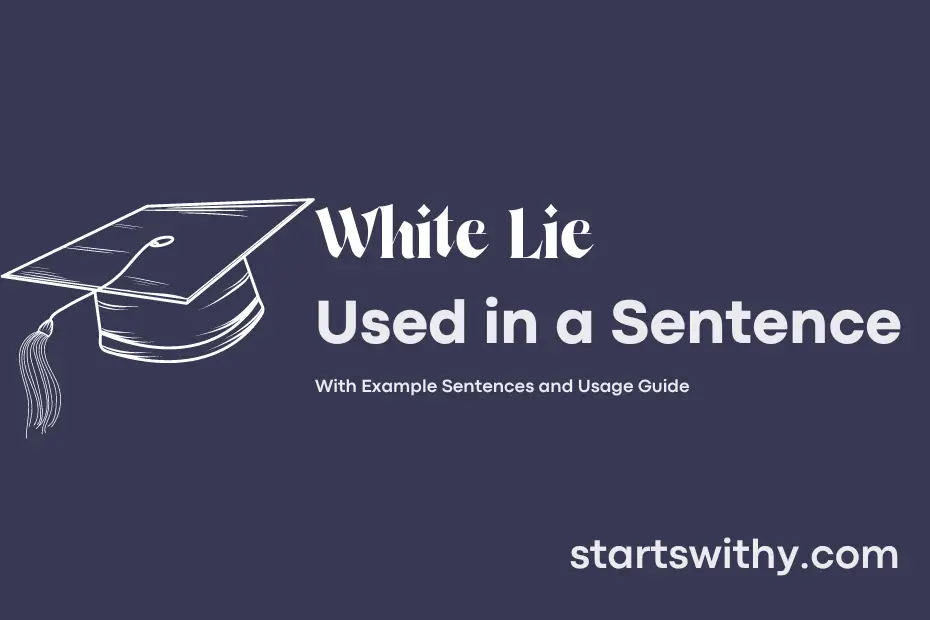Have you ever told a white lie to spare someone’s feelings or avoid a difficult situation? A white lie is a harmless falsehood told to protect others or preserve relationships by concealing the truth without causing harm.
These fibs are typically minor and intended to avoid conflict or prevent hurt feelings. While they may seem innocent, white lies can have a significant impact on trust and credibility in relationships if used irresponsibly.
7 Examples Of White Lie Used In a Sentence For Kids
- A white lie is a small fib that we tell to make someone feel better.
- It’s not nice to tell a white lie because honesty is important.
- Sometimes, we might tell a white lie to protect someone’s feelings.
- It’s better to be truthful instead of telling a white lie.
- Remember, a white lie is like a little story that is not true.
- We should always try to be honest and not rely on telling a white lie.
- Let’s practice telling the truth instead of resorting to a white lie.
14 Sentences with White Lie Examples
- White lie: “I told my professor that I had a family emergency when I actually just overslept.”
- For my last-minute absence, I had to come up with a white lie about a sudden illness.
- When my friend asked for feedback, I had to tell a white lie to avoid hurting their feelings.
- I had to resort to a white lie about my internet being down to get an extension on my assignment.
- To avoid going to a boring event, I told my friend a small white lie about having other plans.
- I felt guilty after telling a white lie to my roommate about borrowing their stuff without asking.
- I had to tell a white lie to my parents about attending a party so they wouldn’t worry.
- When I forgot about our group study session, I came up with a white lie about having a doctor’s appointment.
- I used a white lie about a family commitment to get out of a group project I didn’t want to be a part of.
- I had to tell a white lie to my professor about a deadline extension to buy more time for my project.
- To avoid confessing my mistake, I resorted to a white lie about losing my notes.
- I felt relieved after telling a white lie to my friend about not being able to help them move out.
- I used a white lie about my phone dying to excuse my absence at a scheduled meeting.
- When I accidentally double-booked myself, I told a white lie about a sudden appointment to get out of one commitment.
How To Use White Lie in Sentences?
To use “White Lie” in a sentence, simply follow these guidelines. A white lie is a harmless or small lie told to avoid hurting someone’s feelings or to prevent unnecessary conflict.
Here are some examples of how to use “White Lie” in a sentence:
-
“I told a white lie to my friend when I said I liked her new haircut, even though I didn’t.”
-
“She didn’t want to hurt his feelings, so she told a white lie and said she was enjoying the movie.”
-
“Sometimes, telling a white lie is better than telling the harsh truth.”
-
“He told a white lie to his boss about being stuck in traffic, when in reality, he overslept.”
Remember, white lies should be used sparingly and for good intentions. They are meant to protect others’ feelings without causing harm. Practice using white lie in different contexts to become more comfortable incorporating it into your vocabulary.
Conclusion
In conclusion, white lies are commonly used in everyday interactions to avoid hurting someone’s feelings or to maintain social harmony. Such sentences may involve small untruths or exaggerations to protect others or oneself from discomfort or conflict. While white lies are often perceived as harmless, their frequency and intent can influence relationships and trust over time. It is important to consider the impact of these seemingly harmless falsehoods and strive for honest and open communication in relationships.
By being mindful of when and why white lies are told, individuals can navigate communication more effectively and build stronger connections based on trust and transparency. Striking a balance between sensitivity and honesty can help maintain healthy relationships while minimizing the need for white lies. Ultimately, fostering open and genuine dialogue can lead to more authentic and fulfilling interactions in the long run.



